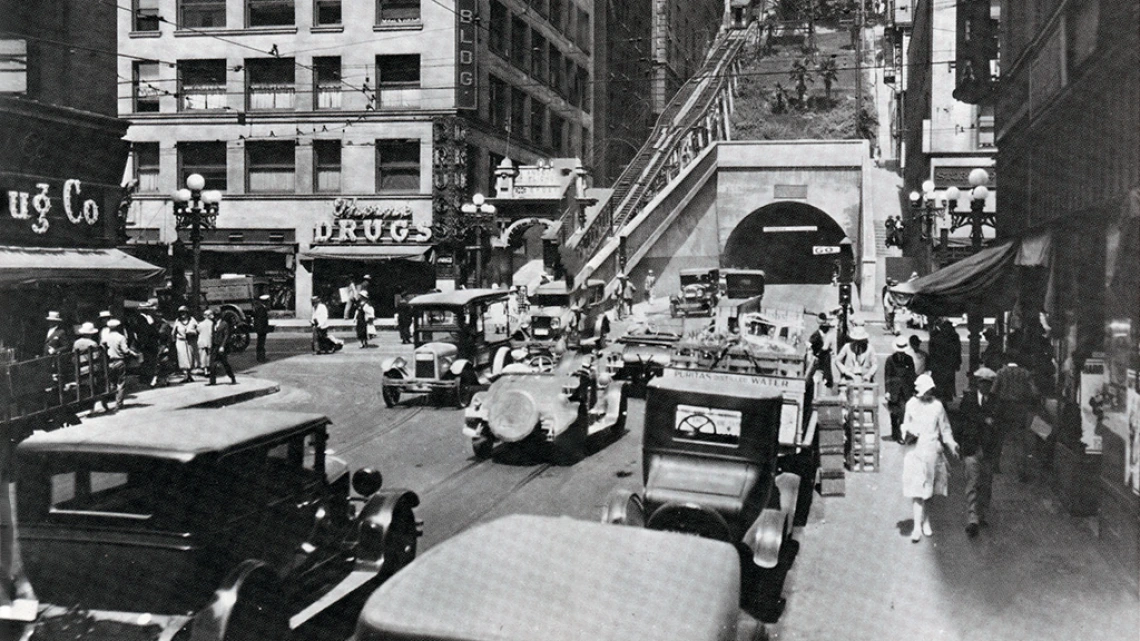Fred Rochlin papers

Angels Flight, Third and Hill Streets; Los Angeles, CA, 1920s.
Collection area: Arizona and Southwest
Collection dates: 1694-2002 bulk (bulk 1880-1930)
Papers, 1694-2002 (bulk 1880-1930). The Fred Rochlin papers contain material relating to his research on the southwestern Jewish community. The collection includes material relevant to the history of Jewish individuals, commercial operations, and communal institutions in Arizona, principally southern Arizona.
This collection primarily consists of autobiographical reminiscences, copies of historical records, correspondence, newspaper clippings, interview transcriptions and notes, photographs and postcards, and scholarly and popular articles and excerpts. The bulk of the material is photocopies of primary source material. Please note that dates listed reflect the subject content of the material.
Fred Rochlin was born in 1923 in a house on a twenty-acre site three miles east of Nogales, on the Arizona-Sonora border. His parents, Annie (Shapiro) and Jake Rochlin, Russian Jewish immigrants settled in Nogales in 1917. Fred, the youngest of their five children, graduated from Nogales High School and briefly attended the University of Arizona, Tucson. In December, 1942, he enlisted in the U.S. Army Air Corps, and was stationed in Italy with 456th Bombardment Group. With 14 citations, he was the 5th most decorated flying officer from Arizona.
Fred enrolled in the University of California at Berkeley, and graduated with a Bachelor of Arts in Architecture in January 1949. While on campus, Fred met and married Harriet Shapiro, a UC Berkeley graduate in Hispanic America. They have four children and three grandchildren.
Following graduation in 1949, Rochlin apprenticed in the offices of two renowned architects: Frank Lloyd Wright and Charles Eames. In 1952, he partnered with Berkeley classmate, Ephraim Baran, to form Rochlin & Baran, Architects, Engineers and Planning. During his tenure as founding partner, 1952 to 1986, the firm completed major medical facilities and observatories in California, seventeen other states, and in Iran and Israel.
While professionally engaged, in his spare time he conducted a passionate search for data and images documenting the history of early Jews in the Southwest, with special emphasis on southern Arizona and Arizona-Sonora border. He was also active in historical societies: American Jewish Historical Society, board member; Los Angeles Historical Society, board member; Southern California Jewish Historical Society, president; Southern Arizona Jewish Historical Society, founding member, Pimeria Alta Historical Society, member.
Bibliography:
Books:
Harriet and Fred Rochlin. Pioneer Jews: A New Life in the Far West. (social history) Houghton Mifflin, Boston, 1984. 11 printings.
Articles, lectures, performances:
- Harriet & Fred Rochlin."Tracking Leopold Ephraim," Western States Jewish Historical Quarterly, Vol. 1, No.2 January 1969, pp.75-84. Harriet and Fred Rochlin. (Introduction) "Reminiscences on an Arizona Pioneer."
- Isaac Goldberg.Western States Jewish Historical Quarterly. April, 1970. Volume 2, Number 3. pp.172-181. Harriet and Fred Rochlin. "Marker 122: The Heart of Ambos Nogales,"
- The Journal of Arizona History, Summer 1976) pp.161-181 Slide Presentation Fred Rochlin. "Jews of Santa Cruz" A 45-minute narrative on the pioneer Jews of Santa Cruz County, (Presented at the American Jewish Historical Society Conference, San Francisco, Ca.1998 and at the Harvard Club, New York City, 2000.
- Monologue "Old Man in a Baseball Cap" 1:10-minute Monolog. Highways Performance Center, 1996 Santa Monica, ; Actors Theatre of Louisville, Louisville, B Street Theatre, Sacramento, CA 1997; McDowell Colony, Petersborough, CT, 1998, Emelin Theatre, Manarroneck, NY, 1998, La Jolla Playhouse, La Jolla, CA, 1998,Taper Auditorium, LAPL, Los Angeles, CA, 1999, Northlight Theatre, Chicago, 1999; Coronet Theatre, Los Angeles, CA, 2001. et al.
Audio books:
Fred Rochlin: Old Man in a Baseball Cap: A Memoir of World War II. HarperCollins. 1999.
Fred Rochlin Old Man in a Baseball Cap: A Memoir of World War II. Harper Audio 1999 (Unabridged) 1999.
A collection guide explains what's in a collection. New to using our collections? Learn how to use a collection guide.
Collection guideAccess this collection
Visit us in person to access materials from this collection. Our materials are one-of-a-kind and require special care, so they can’t be checked out or taken home.
How to cite
Learn how to cite and use materials from Special Collections in your research.
